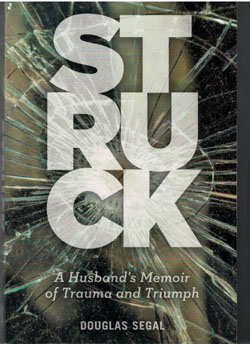Struck: A Husband’s Memoir of Trauma and Triumph by Douglas Segal, © 2018, Prospect Park Books, ISBN 9781945-551383; 253 pages plus acknowledgments, $16.
By Donald H. Harrison

 SAN DIEGO – Doug Segal, a contract writer and producer for Hollywood, wrote this compelling memoir after his wife Susan, a sometime actress, was severely injured in a freak accident on Hollywood Boulevard, when a bus, attempting to avoid an errant truck, crossed over into oncoming traffic and had a head-on collision with Susan’s car. Somehow, miraculously, their daughter Alyce was not seriously hurt, but Susan had numerous broken bones, a fractured pelvis, and a broken neck. Most doctors at Cedars-Lebanon Hospital in Los Angeles feared she had little chance of survival.
SAN DIEGO – Doug Segal, a contract writer and producer for Hollywood, wrote this compelling memoir after his wife Susan, a sometime actress, was severely injured in a freak accident on Hollywood Boulevard, when a bus, attempting to avoid an errant truck, crossed over into oncoming traffic and had a head-on collision with Susan’s car. Somehow, miraculously, their daughter Alyce was not seriously hurt, but Susan had numerous broken bones, a fractured pelvis, and a broken neck. Most doctors at Cedars-Lebanon Hospital in Los Angeles feared she had little chance of survival.
However, they did not know Susan Segal’s strong will, nor Doug Segal’s capacity to see her through the ordeal, whatever may come. Perhaps as important was the strong, loving support that the Segal family (also including Michael, Alyce’s older brother) received from the congregants of Temple Israel of Hollywood, as well as from relatives and friends around the country. Doug kept updating those interested with a running Internet memo about Susan’s recovery progress, and this—along with deeper thoughts that came to him while sitting at Susan’s bedside—are key components of the book.
The book’s subtitle, “Memoir of Trauma and Triumph,” reveals that Susan not only survived but eventually thrived, so I am not giving anything away by telling you how the story ends. What’s really important about this book, which will bring you, perhaps remembering your own family’s medical trials, into the heart of the Segal family is the absolute candor with which Doug wrote about what he, Susan and their children went through in the wake of the accident. He chronicles movingly the difficulties they experienced on the road to recovery, underscoring how important the 2H’s – hope and humor – are when a family must confront recuperation from a near-death experience.
Recovery from a serious trauma can be a messy business, and a less candid writer might have been tempted to leave out, or write around, embarrassing situations. Susan’s brain had been injured and while lying stiffly in her hospital bed, she had strange hallucinations. After her catheter was removed, Susan needed help to get to the bathroom. After her “halo” was removed, which had kept her from moving her head, she needed assistance washing and styling hair from which clumps fell out. Having that apparatus on her body for months meant she couldn’t wash under it, causing her distress when she realized that she smelled bad. Broken bones in her arms prevented Susan from cleaning herself after toileting; this became Doug’s job. Later in the recovery process, resuming sexual relations was a trial for both spouses; there just was no way to make love comfortably. Some follow-up operations were necessary to remove bones that had grown back too much, with one result from the anesthesia being severe constipation for Susan. Doug had to excavate. These challenges the couple faced together, and often laughed about it.
Struck is both painful and delightful to read. I know that sounds contradictory. However, Doug makes the point that sometimes out of bad can come good. The accident was terrible. The love that was showered on their family as a result of the accident was heart-warming. Read the book, which is scheduled for publication in October. You will see what I mean.
*
Harrison is editor of San Diego Jewish World. He may be contacted via donald.harrison@sdjewishworld.com